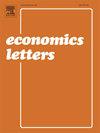信仰分歧与债务期限结构
IF 2.1
4区 经济学
Q2 ECONOMICS
引用次数: 0
摘要
本文探讨了投资者的信念分歧如何影响企业的债务期限选择。我们发现,在存在信念分歧的情况下,企业更倾向于选择短期债务而非长期债务。这是因为短期债务风险较小,可以吸引更多乐观的投资者,从而提高债务价格,降低债务融资成本。当长期债务的风险比短期债务大,且投资者的信念离散程度较高时,我们的结果会更明显。本文章由计算机程序翻译,如有差异,请以英文原文为准。
Belief disagreement and debt maturity structure
This paper examines how investors’ belief disagreement affects the firm’s debt maturity choice. We find that in the presence of belief disagreement, the firm prefers short-term debt to long-term debt. This is because short-term debt is less risky and can attract more optimistic investors, which raises the debt price and reduces the cost of debt financing. Our result is stronger when long-term debt is more risky compared to short-term debt and investors’ belief dispersion is higher.
求助全文
通过发布文献求助,成功后即可免费获取论文全文。
去求助
来源期刊

Economics Letters
ECONOMICS-
CiteScore
3.20
自引率
5.00%
发文量
348
审稿时长
30 days
期刊介绍:
Many economists today are concerned by the proliferation of journals and the concomitant labyrinth of research to be conquered in order to reach the specific information they require. To combat this tendency, Economics Letters has been conceived and designed outside the realm of the traditional economics journal. As a Letters Journal, it consists of concise communications (letters) that provide a means of rapid and efficient dissemination of new results, models and methods in all fields of economic research.
 求助内容:
求助内容: 应助结果提醒方式:
应助结果提醒方式:


